

Differences Between In-Home Care Services
What are Home Health, Home Care, Palliative and Hospice Care?
When an older loved one or adult with a disability needs caring support at home, it can feel daunting to know which professional care services are best. Who can help with bathing and meals? Is a registered nurse needed for wound care? Can hospice care happen at home?
The Global Coalition on Aging and the Home Care Association of America state that almost 70% of Americans who turn age 65 will need assistance at some point to care for themselves. These senior care industry leaders also report that “already 40% of adults aged 65+ need assistance with daily living activities.”1 The fast-growing care needs of the country’s increasingly older population can leave care recipients and their families confused over in-home care options. The complexity of nonmedical and medical services available also may jeopardize a loved one from getting the timely and attentive care they need.
To help simplify the professional in-home care choices, Lorraine Grote Johnson, Director of Care Quality at Right at Home, a leading in-home care agency, notes that it is important to understand the differences between home care and home healthcare. Grote Johnson, a registered nurse for more than 35 years in both hospital and home settings, gives the following overview of common care services available in the home.
Extended Reading: Meet Right at Home Registered Nurse Lorraine Grote Johnson
Home Care
In-home caregivers are the extra hand to provide personalized support to a loved one in their own familiar home surroundings. Home care can be part time, full time or live-in assistance ranging from light housekeeping and meal preparation to personal grooming and toileting. At-home caregivers can provide care services such as being a companion who helps write the grandchildren to driving the care client to medical appointments and to complete errands. Home care allows a loved one to stay safe and independent at home as long as possible. Grote Johnson points out that home care staff members are not legally allowed to take on skilled medical care such as dispensing medications and working with tube feedings. Most at-home caregiving services are covered through private pay.
Extended Reading: Personal Care Assessment vs. Skilled Care Assessment
Home Healthcare
Home healthcare is skilled nursing care that is prescribed and directed by a physician and supervised by a registered nurse. Home healthcare is suited for complex health issues that require a higher level of medical assistance, or when a loved one is recovering from an injury or recent illness. A professional skilled nursing team can accommodate a client’s numerous medical care situations such as monitoring vital signs, medication setup and management, dressing changes, and continence care.
“Generally, home healthcare is delivered by Medicare-certified companies and may include physical therapy, occupational therapy and speech therapy,” Grote Johnson said. “A registered nurse makes a care plan and supervises a home health aide who helps a client with activities of daily living such as bathing and dressing. The RN does supervisory visits in the home at least once every two weeks.”
Medicare and other health service providers that pay for home healthcare determine the number and length of nurse visits to the home. Private pay skilled nursing care has no limit on in-home service hours. Specialized palliative care and hospice care also fit within the realm of home healthcare.
Palliative Care
Palliative (PAL-ee-ey-tiv) care is specialized support for people living with a serious illness or transitioning toward death. Palliative care focuses on pain relief, comfort and reduced stress for an ill loved one and balanced overall health for the patient and family members. Palliative care serves not only the dying but also those with chronic diseases such as cancer, congestive heart failure, kidney disease and Alzheimer’s. A specially trained palliative care team includes doctors, nurses, professional caregivers and other specialists who work together to improve the quality of life for the care client.
Extended Reading: National Hospice and Palliative Care Month
Hospice Care
Originating in Europe during the Middle Ages, hospice, which is derived from the Latin word for “hospitality,” is care that aids the critically ill and dying with medical, emotional and spiritual support. Hospice or end-of-life care is a type of palliative care, but the ailing person is no longer seeking curative treatment. The aim of hospice care is to extend comfort, peace and dignity to individuals in the dying process. Hospice programs also support a patient’s family with counseling and bereavement care. Hospice teams of doctors, nurses, social workers, chaplains and other caregivers provide care in patients’ homes or at a hospice center, hospital or in-patient care facility.
“Hospice typically serves a terminally ill person with a life expectancy of six months or less,” Grote Johnson explains. “In some cases, a hospice patient’s health improves to the point where the individual no longer needs the specialized care. Also, if a person starts to feel better, he or she may want to negate hospice and start receiving curative medical treatment again. At any point, a hospice client can change their mind about their care.”
Extended Reading: We Need to Talk about Death and Celebrate Life
Tips for Choosing At-Home Care
Because of the quickly expanding number of at-home services on the market today, those in need of care and their families may want to consider the following tips for choosing at-home care:
- Select services only from a professional, licensed agency. Make sure you see actual proof of certification and licensing for the agency.
- Be certain that the caregiver who works with your loved one is insured and bonded.
- Get a detailed care plan or treatment plan upfront. Ask about goals of the suggested services.
- Review the caregiver’s qualifications, experience and amount of supervision on the job.
- Discuss all financial costs and evaluate options for saving money on home care, including long-term care insurance, a reverse mortgage, Veterans Aid and Attendance benefits, etc. Reference Right at Home’s information on how to pay for home care.
For securing skilled nursing care and home healthcare, Grote Johnson offers additional suggestions. “Choose a company that knows and maintains federal and state regulations,” Grote Johnson advises. “Make sure the company does criminal background checks on their nurses and caregivers and verifies their licenses. Ask whether the nursing staff has gone through a thorough orientation and if they know infection control practices and what to do in emergencies. Also, make sure skilled nursing staff members have critical thinking skills and completed competency testing, and that home health nurses have the proper qualifications, because they are taking your loved one’s life into their hands in what could be life-or-death situations.”
Availability of qualified at-home services varies by locales across the country, so it is beneficial to review at-home agencies online, then visit with the agencies in person. Be sure to check references of the in-home agency candidates and their specific caregivers. Also, talk to others in the community who are familiar with the agencies and their reputations. In getting the best care possible for a loved one, every question and concern matters.
For additional information about choosing home care, home healthcare, palliative care or hospice care in your area, talk with local medical professionals for referrals, or contact the National Association for Home Care & Hospice at nahc.org, or use the U.S. Administration on Aging’s Eldercare Locator at https://eldercare.acl.gov/Public/Index.aspx.
1 Caring for America’s Seniors: The Value of Home Care. Retrieved from http://www.hcaoa.org/







